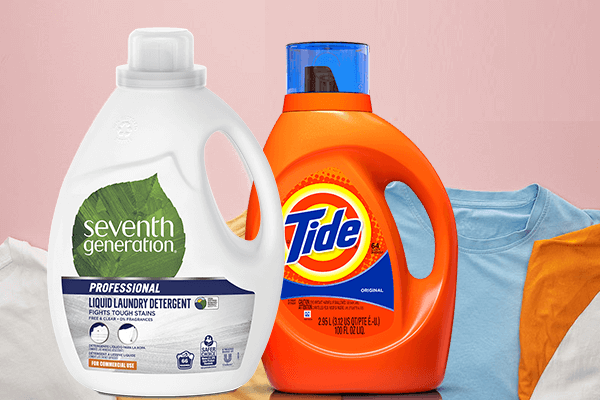Laundry detergent is a crucial part of keeping clothes clean and fresh. Two of the most popular laundry detergent brands are Seventh Generation and Tide. Both of these brands have a long history of providing high-quality detergent.
Still, the main difference is that Seventh Generation uses natural and plant-based ingredients, while Tide uses synthetic and natural ingredients. This means that Seventh Generation is a more eco-friendly option, while Tide is a more traditional option.

Contents
Differences Between Seventh Generation and Tide Laundry Detergent
Regarding laundry detergent, countless options are available on the market. In contrast, both brands are known for their effectiveness in cleaning clothes. There are some key differences between the two that consumers should be aware of before purchasing.
Ingredients
Seventh Generation is known for using natural and plant-based ingredients, while Tide combines synthetic and natural ingredients. This means that Seventh Generation is a more eco-friendly option, while Tide is a more traditional option.
Seventh Generation is made with ingredients that are non-toxic, biodegradable, and not tested on animals, making it a more socially responsible brand. On the other hand, Tide’s ingredients need to be fully disclosed, and it is unknown whether they are eco-friendly.
Effectiveness
Tide is known for being one of the most effective laundry detergents on the market and is often recommended for tough stains and heavy-duty cleaning. Tide’s heavy-duty cleaning capabilities are due to its high levels of enzymes and surfactants that can break down dirt and stains.
Seventh Generation, on the other hand, is known for being a more gentle and mild detergent best suited for everyday use. This is because it’s made with plant-based ingredients that are mild on the skin and the environment.
Price
Seventh Generation is generally more expensive than Tide, which can make it a less affordable option for some consumers. However, it’s important to note that Seventh Generation is often sold in smaller quantities, making it more expensive per ounce than Tide. Additionally, the higher price of Seventh Generation can be justified by its eco-friendly, socially responsible, and non-toxic ingredients.
Fragrance
Seventh Generation offers fragrance-free options, while Tide typically includes a fragrance. This can make Seventh Generation a better option for those with sensitive skin or allergies and those who prefer fragrance-free products. Additionally, some fragrances used in Tide products may contain phthalates, which are harmful to human health.
Sustainability
Seventh Generation is known for its commitment to sustainability, which includes using eco-friendly ingredients and packaging.
On the other hand, Tide is more traditional in its approach, which includes synthetic ingredients and packaging that may not be as environmentally friendly.
Seventh Generation’s sustainable approach is not only limited to its ingredients and packaging, but also its manufacturing, logistics, and distribution processes. Tide, however, needs to have information about its sustainability initiatives.
Certifications
Seventh Generation is certified by various organizations such as USDA, Green Seal, and Leaping Bunny, ensuring that its products meet certain environmental and social responsibility standards.
Tide, however, does not have any such certifications. These certifications give consumers confidence in the product they buy, knowing that it meets certain standards and is socially and environmentally responsible.
Formulas
Seventh Generation offers laundry detergents for different laundry loads, such as HE, cold water, and high efficiency.
Conversely, Tide has a broad range of formulas, such as Tide Pods, Tide Liquid, and Tide Powder, but they are not specific to certain types of laundry loads.
This means Seventh Generation caters to the specific needs of different types of laundry loads, while Tide is a one-size-fits-all option. This can benefit consumers who have specific laundry needs and want a detergent tailored to their needs.
Similarities Between Seventh Generation and Tide Laundry Detergents
Despite the many differences between Seventh Generation and Tide laundry detergent, there are also several similarities. These similarities can help consumers choose a detergent that best suits their needs.
Brand Recognition
Seventh Generation and Tide are well-known and respected brands in the laundry detergent market. Both brands have been around for many years and have a strong reputation for providing high-quality detergent that effectively cleans clothes. This brand recognition gives consumers peace of mind when purchasing these detergents, knowing they are buying from a reputable brand.
Packaging
Seventh Generation and Tide are available in various packaging options, including liquid, powder, and pods. This means consumers can choose the best option for their needs and preferences. Whether you prefer a liquid, powder, or pod detergent, Seventh Generation and Tide have options.
Effectiveness
Seventh Generation and Tide are effective at cleaning clothes, although they have different strengths. Tide is known for its heavy-duty cleaning capabilities, while Seventh Generation is known for its everyday cleaning capabilities. This means that consumers can choose the detergent that best suits their needs based on the type of cleaning they require.
Availability
Seventh Generation and Tide are widely available in most major supermarkets, retail stores, and online platforms. This makes it easy for consumers to find and purchase these detergents. This also means that consumers don’t have to go out of their way to find these detergents, making them easily accessible.
Compatibility
Seventh Generation and Tide are compatible with all types of washing machines, including top-loading, front-loading, and high-efficiency. This makes it convenient for consumers to use these detergents regardless of their washing machine type. This means consumers can avoid buying a detergent incompatible with their washing machine.
Conclusion
Seventh Generation and Tide are both popular brands of laundry detergent that have their own unique set of features and benefits. However, the two have some key differences, such as the ingredients they use, their effectiveness, and their price.
Despite these differences, both brands are known for providing high-quality detergent that can effectively clean clothes, and both are available in different packaging options. Furthermore, it can also help consumers make a more environmentally-friendly decision if they consider it important. Ultimately, the choice between these two brands will come down to personal preferences and the consumer’s specific needs.
